THOUGHTFUL AND PROVOCATIVE. LOS ANGELES TIMES
NARCISSISM
A re you a narcissist? Do you interact with someone who is? Contrary to popular -belief, narcissists do not love themselves or anyone else. They cannot accept their true selves, constructing instead fixed masks that hide emotional numbness. Influenced by forces in culture and predisposed by factors in the human personality, narcissists tend to be
 More concerned with how they appear than what they feel
More concerned with how they appear than what they feel
 Seductive and manipulative, striving for power and control
Seductive and manipulative, striving for power and control
 Egotists, focused on their own interests but lacking the true values of the selfself-expression, self-possession, dignity, and integrity
Egotists, focused on their own interests but lacking the true values of the selfself-expression, self-possession, dignity, and integrity
 Without a solid sense of self, which leads them to experience life as empty and meaningless
Without a solid sense of self, which leads them to experience life as empty and meaningless
In this groundbreaking study, Dr. Alexander Lowen uses his extensive clinical experience to demonstrate how narcissists can recover their suppressed feelings and regain their lost humanity. By the use of Bioenergetic Analysis, the psychotherapy created by Dr. Lowen, a new possibility of a fulfilling and authentic life is presented for people with narcissistic characteristics and for those who interact with them.
Alexander Lowen, M.D., is a world-renowned psychiatrist and leading practitioner of Bioenergetic Analysisthe revolutionary therapy that uses the language of the body to heal the problems of the mind. A former student of Wilhelm Reich, he developed Bioenergetic Analysis and founded the International Institute for Bioenergetic Analysis. Dr. Lowen is the author of many publications, including Love and Orgasm, The Betrayal of the Body, Fear of Life, Joy, and The Way to Vibrant Health . Now in his tenth decade, Dr. Lowen currently practices psychiatry in New Canaan, Connecticut.

Cover design by Leah Lococo
Cover photograph Johner/Photonica
Register online at www.simonandschuster.com for more information on this and other great books.

OTHER BOOKS BY ALEXANDER LOWEN:
Fear of Life
The Way to Vibrant Health
Bioenergetics
Depression and the Body
Pleasure: A Creative Approach to Life
Betrayal of the Body
Love and Orgasm
The Language of the Body
Thank you for purchasing this Touchstone eBook.
Sign up for our newsletter and receive special offers, access to bonus content, and info on the latest new releases and other great eBooks from Touchstone and Simon & Schuster.

or visit us online to sign up at
eBookNews.SimonandSchuster.com


TOUCHSTONE
Rockefeller Center
1230 Avenue of the Americas
New York, NY 10020
www.SimonandSchuster.com
Copyright 1985 by Alexander Lowen, M.D.
All rights reserved, including the right of reproduction in whole or in part in any form.
First Touchstone Edition 1997
TOUCHSTONE and colophon are registered trademarks of Simon & Schuster, Inc.
Designed by Jack Meserole
ISBN-13: 978-1-4391-4468-8
Library of Congress Cataloging-in-Publication data is available.
ISBN-13: 978-0-684-84299-8
ISBN-10: 0-684-84299-8
ISBN-13: 978-0-7432-5543-1 (Pbk)
ISBN-10: 0-7432-5543-7 (Pbk)
CONTENTS
I WISH to express my thanks to Dr. Michael Conant and Mirra Ginsburg, who read parts of the manuscript and offered some helpful suggestions; to Marion Wheeler, editor at Macmillan, whose advice greatly strengthened this study; and to Ruth MacKenzie of the International Institute for Bioenergetic Analysis, who graciously typed and retyped the manuscript.
NARCISSISM describes both a psychological and a cultural condition. On the individual level, it denotes a personality disturbance characterized by an exaggerated investment in ones image at the expense of the self. Narcissists are more concerned with how they appear than what they feel. Indeed, they deny feelings that contradict the image they seek. Acting without feeling, they tend to be seductive and manipulative, striving for power and control. They are egotists, focused on their own interests but lacking the true values of the selfnamely, self-expression, self-possession, dignity, and integrity. Narcissists lack a sense of self derived from body feelings. Without a solid sense of self, they experience life as empty and meaningless. It is a desolate state.
On the cultural level, narcissism can be seen in a loss of human valuesin a lack of concern for the environment, for the quality of life, for ones fellow human beings. A society that sacrifices the natural environment for profit and power betrays its insensitivity to human needs. The proliferation of material things becomes the measure of progress in living, and man is pitted against woman, worker against employer, individual against community. When wealth occupies a higher position than wisdom, when notoriety is admired more than dignity, when success is more important than self-respect, the culture itself overvalues image and must be regarded as narcissistic.
The narcissism of the individual parallels that of the culture. We shape our culture according to our image and in turn we are shaped by that culture. Can we understand one without understanding the other? Can psychology ignore sociology, or vice versa?
In the forty years I have worked as a therapist, I have seen a marked change in the personality problems of the people consulting me. The neuroses of earlier times, represented by incapacitating guilts, anxieties, phobias, or obsessions, are not commonly seen today. Instead, I see more people who complain of depression; they describe a lack of feeling, an inner emptiness, a deep sense of frustration and unfulfillment. Many are quite successful in their work, which suggests a split between the way they perform in the world and what goes on inside. What seems rather strange is a relative absence of anxiety and guilt, despite the severity of the disturbance. This absence of anxiety and guilt, coupled with an absence of feeling, gives one an impression of unreality about these people. Their performancesocially, sexually, and in the work worldseems too efficient, too mechanical, too perfect to be human. They function more like machines than people.
Narcissists can be identified by their lack of humanness. They dont feel the tragedy of a world threatened by a nuclear holocaust, nor do they feel the tragedy of a life spent trying to prove their worth to an uncaring world. When the narcissistic faade of superiority and specialness breaks down, allowing the sense of loss and sadness to become conscious, it is often too late. One man, the head of a large company, was told that he had terminal cancer. Faced with the loss of life, he discovered what life was. I never saw flowers before, he explained, nor the sunshine and the fields. I spent my life trying to prove to my father that I was a success. Love had no place in my life. For the first time in his adult life, this man was able to cry and to reach out to his wife and children for help.
Next page
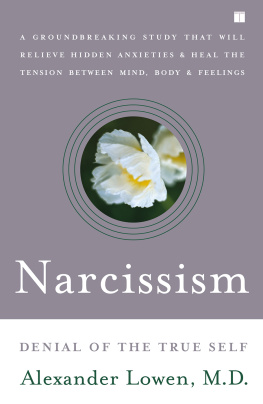
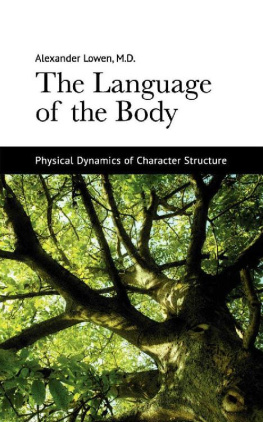


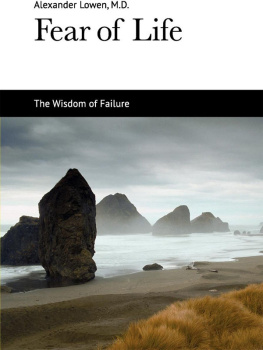


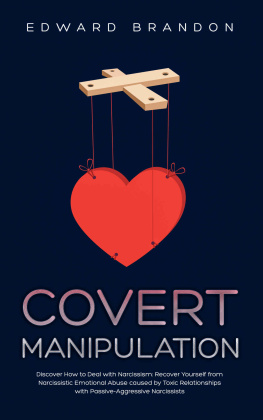
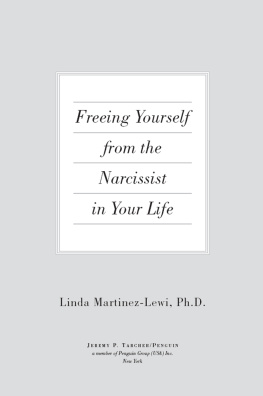
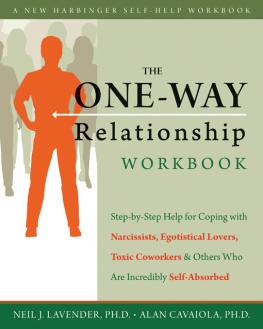
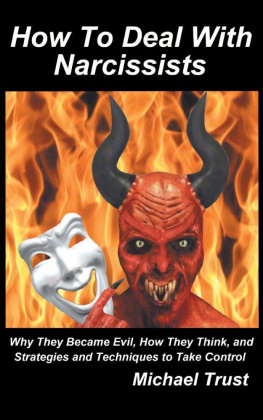

 More concerned with how they appear than what they feel
More concerned with how they appear than what they feel



